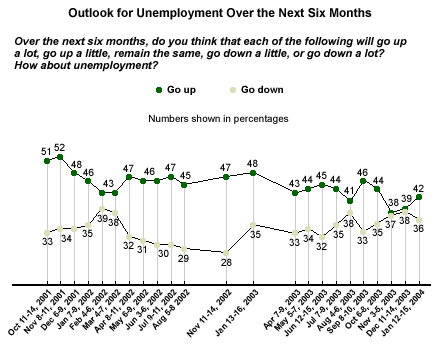"Everything we know about economics indicates that the sort of economic growth expected for the next year, 3.8 to 4 percent, will translate into 2 million new jobs from the third quarter of this year to the third quarter of next year -- I would stake my reputation on employment growth happening before Christmas," Treasury Secretary John W. Snow said in October of last year. To meet this prediction, employers would need to add 500,000 new jobs to their payrolls every quarter, from the last quarter of 2003 until the third quarter of 2004.
So far, only 144,000 new jobs have been added to nonfarm payrolls as of the last quarter of 2003. And Snow is not the only pundit who got the economy wrong where unemployment is concerned. The consensus among economists was that the economy would add in the range of 150,000 jobs in December 2003; in reality, only 1,000 jobs were created that month.
While seasonal adjustment factors were invoked as the reason for the poor December numbers, the current recovery has been characterized by the anomaly of weak job growth in the face of increasing GDP and productivity. And with more than 2.9 million private-sector jobs lost over the last three years, there is no doubt that many Americans are feeling the pain of this macroeconomic anomaly. Gallup's most recent economic polling data underscore that fact.
America Remains Unconvinced
In a Jan. 12-15 poll*, Gallup asked Americans on an open-ended basis what they think is the most important problem facing the country today. Thirty-seven percent mentioned some aspect of the economy as the most important problem (by comparison, 16% were most concerned about the situation in Iraq). While 16% fretted about economic conditions in general, another 13% more specifically cited unemployment as the most important problem. Clearly, a significant number of Americans are worried about jobs.
In the same poll, 68% of Americans said it is a bad time to find a quality job, when asked about this specifically. Perhaps most tellingly, Americans remain unconvinced that the unemployment rate is declining. According to the Jan. 12-15 poll, 42% of Americans believe unemployment will actually go up in the next six months.

Beyond outsourcing jobs to countries with lower labor costs, disruptive technologies (such as e-commerce) have changed the economics of trade and the production function. While the present unemployment rate of 5.7% is not alarming by historical standards, and some of the job losses might be explained by labor markets compensating for their "bubble economy" excesses, there have been distinct structural changes that will moderate the outlook for job growth.
Bottom Line
The good news is that job growth in the short run is unquestionable -- wide-ranging economic indicators confirm an upcoming rebound in payrolls. Initial jobless claims have been hovering below the decisive 350,000 mark in recent weeks, and firms have been relying heavily on temporary workers. As firms see increased earnings and pricing power, hiring is inevitable. But beyond November, when the election is over and the next administration finds itself faced with twin deficits, the possibility of rate hikes, and little room for monetary or fiscal stimulus, there are fewer certainties.
*Results are based on telephone interviews with 1,004 national adults, aged 18 and older, conducted Jan. 12-15, 2004. For results based on the total sample of national adults, one can say with 95% confidence that the margin of sampling error is ±3 percentage points.

